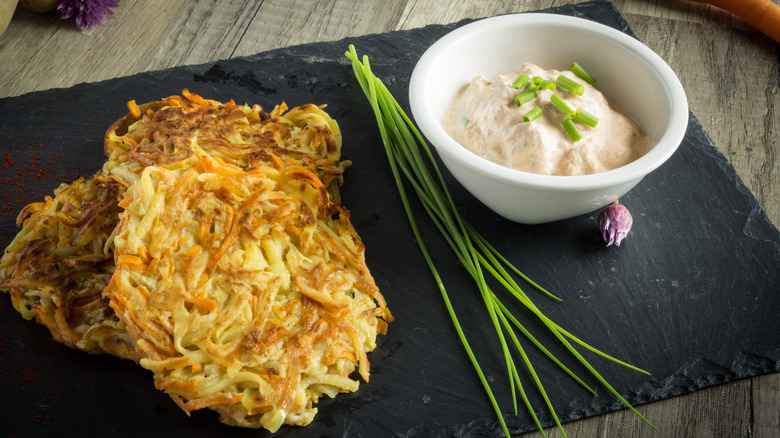Should The Potatoes For Rösti Be Raw Or Parboiled?
If you love potatoes — and really, who doesn't? — we think you'll agree that there's just something special about potato pancakes. From Hanukkah latkes crowned with applesauce and sour cream to Irish potato cakes flecked with chives to Swedish rårakor topped with lingonberry jam (via Swedish Spoon), crispy, golden, fried potato pancakes are a thing of beauty.
One entry in the category worth mentioning is a Swiss potato pancake called rösti, which is typically made pan-sized (as opposed to smaller cakes) and eaten at breakfast with eggs, bacon, and cheese (via Swiss Family Fun). If you've ever made a rösti at home, and compared recipes before doing so, you might have noticed that there's some debate over whether to use raw grated potatoes, as in many other potato pancakes, or whether to parcook the spuds first.
Curious which task to take? Read on to find out what native Swiss recommend.
For authentic rösti, parboil whole potatoes first
If you've ever made a potato pancake such as a latke, you're probably used to grating potatoes, seasoning them, binding them with eggs and some type of flour, and frying them in fat. But according to The Guardian, authentic Swiss rösti call for parboiling the potatoes and then grating them. Food columnist Felicity Cloake researched and even cooked differing versions of the dish before finally encountering the book "Culinary Arts & Traditions of Switzerland," which notes that in the Zurich area only, raw potatoes are used in the pancake; In the rest of the country, whole potatoes are parboiled, peeled, and then grated, creating a "soft, melting interior" that's more tender than the waxier version resulting from raw potatoes.
Serious Eats also weighs in on the matter, with the site's senior culinary director Daniel Gritzer consulting a friend's Swiss-German mother to get the scoop: Parboiled is best, she confirmed. "Raw doesn't taste the same, more like a latke," he was told by the friend.
After parboiling, Serious Eats notes, the potatoes should be drained and cooled in the refrigerator for at least eight hours and up to three days: Doing so gelatinizes the starch and allows the potatoes to be grated without falling apart. Follow these tips, and your next rösti will be authentic enough to charm any Swiss national.

